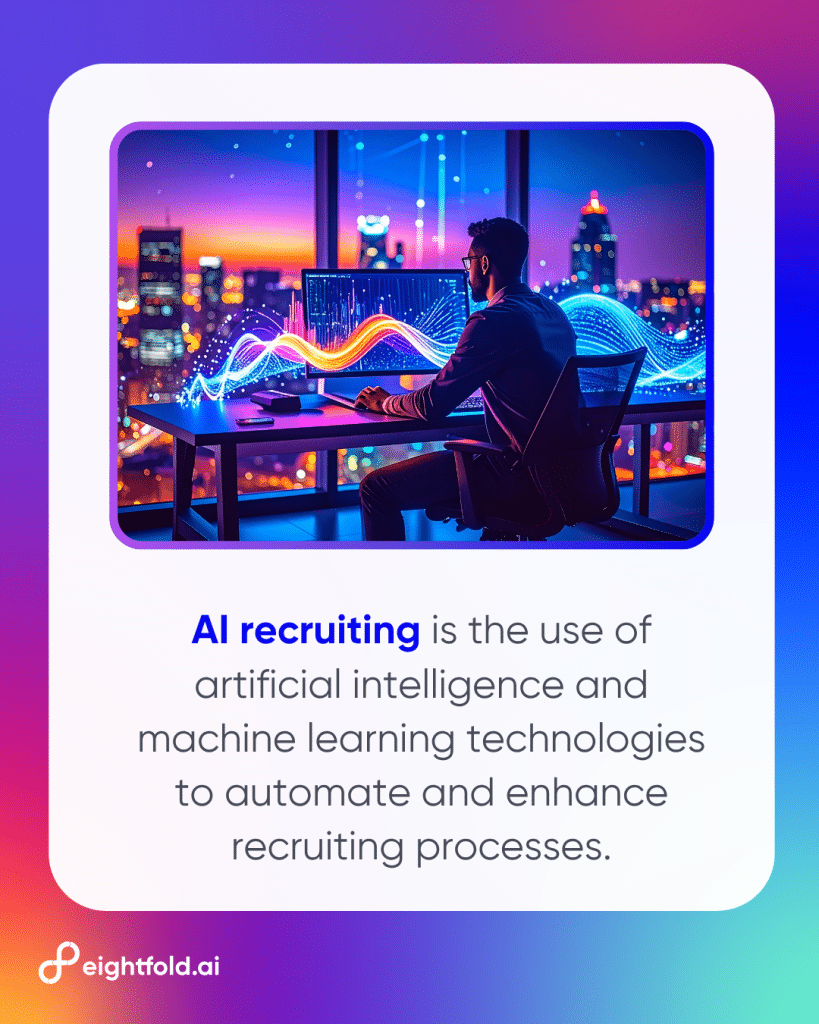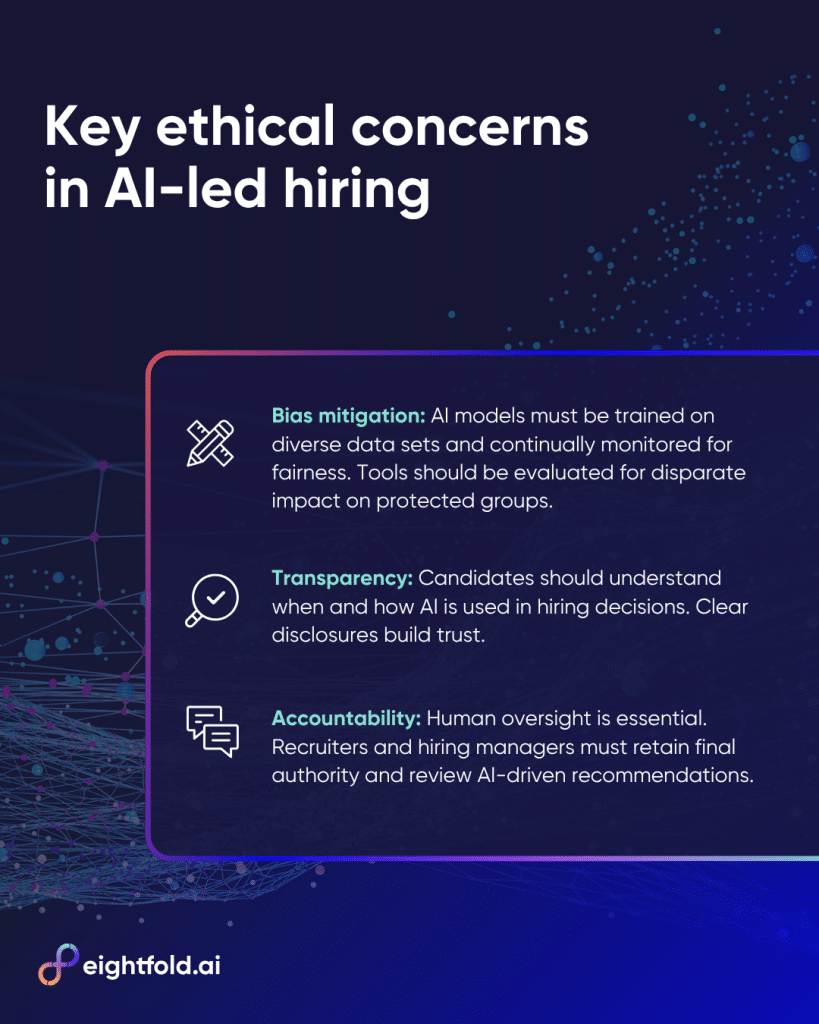- AI is already transforming hiring, from résumé screening to predicting top performers, and it’s helping recruiters move faster, smarter, and more fairly.
- When used in an ethical way, AI can reduce bias and boost efficiency — but it still needs human judgment, ethical oversight, and the right balance to work.
- To thrive in the AI age, recruiters need new skills like data fluency and tech-savvy empathy, and job seekers need to know how to stand out to the machines.
Artificial intelligence is transforming nearly every industry, and hiring is no exception. From parsing résumés in seconds to identifying top candidates with unprecedented precision, AI is revolutionizing how talent teams find, evaluate, and engage job seekers.
This transformation is part of a larger wave of digital acceleration. Organizations are under pressure to do more with less in a tight labor market. Talent scarcity, hybrid work, and rising candidate expectations have made traditional recruiting models inefficient.
To stay competitive, organizations are turning to AI-powered tools that make hiring faster, smarter, and more equitable.

What is AI recruiting?
AI recruiting refers to the use of artificial intelligence and machine learning technologies to automate and enhance recruiting processes.
Unlike traditional hiring methods, which rely heavily on manual work and subjective judgments, AI tools can scan résumés, screen candidates, and even predict hiring success using data-driven algorithms.
Helpful terms to understand:
- Artificial intelligence (AI) is the broad concept of machines performing tasks that typically require human intelligence.
- Machine learning is a subset of AI that allows systems to learn from data and improve over time.
- Automation refers to rules-based systems that carry out repetitive tasks without learning or adapting.
In recruitment, AI often combines machine learning with automation to improve efficiency and reduce bias, if used responsibly.
Real-world applications of AI in hiring
AI in recruiting isn’t theoretical. It’s already in play across many organizations. Here are some of the most common and impactful use cases:
- Résumé parsing: AI can extract structured data from résumés, enabling faster filtering and ranking of candidates.
- Chatbots: Virtual assistants can answer candidate questions, schedule interviews, and guide applicants through the hiring process, 24/7.
- Candidate ranking: Algorithms score applicants based on experience, skills, and fit, helping recruiters prioritize the strongest matches.
- Predictive analytics: AI can forecast which candidates are most likely to succeed in a role, reducing time to hire, and improving quality of hire.
These tools not only improve speed and scale. These also allow recruiters to focus more on relationship-building and less on administrative tasks.
How agentic AI solves high-volume hiring challenges
One real-world application already benefitting from agentic AI is high-volume hiring. For industries like retail, logistics, and health care, posting a job can mean hundreds of applications overnight — more than any recruiter can realistically review. Traditional methods, built for specialist roles, collapse under this kind of pressure: screening slows down, interviews become inconsistent, and qualified candidates walk away when processes drag on.
The result? Lost revenue, understaffed teams, and frustrated hiring managers.
Agentic AI changes the equation. Instead of forcing recruiters to ration interviews, AI-powered recruiting agents screen every applicant instantly and consistently, 24/7. Candidates move directly from application to interview, no scheduling delays required. Recruiters get structured, high-quality insights on every candidate, so they can focus on decisions instead of repetitive tasks.
Organizations already using this approach are filling critical roles faster, improving candidate experience, and making better hires at scale. High-volume hiring no longer has to mean compromise. With agentic AI, enterprises can finally match their recruiting capacity to their workforce needs.

See how organizations around the world are using our single AI platform to hire, retain and grow a diverse workforce, faster than ever before.
Eightfold AI Interviewer: scaling recruitment with autonomous AI
Eightfold AI Interviewer can transform your recruitment process with agentic AI that autonomously conducts structured, skills-based interviews at scale. This innovative tool enables you to engage, evaluate, and advance talent with the precision of a human concierge, conducting thousands of interviews in parallel while generating transcripts and summaries for your hiring teams.
The platform focuses exclusively on your candidates’ skills, experiences, and capabilities — never analyzing facial expressions, tone, or emotion — ensuring you remain compliant with current regulations. With multilingual support across more than 20 languages and bias-audited models, you can reach diverse candidate pools such as veterans, career switchers, and caregivers returning to work.
Early use cases show organizations have reduced time to first interview by up to 90% while improving both candidate satisfaction and recruiter productivity. Recently recognized as one of 2025’s Top HR Tech Products, AI Interviewer allows you to move from application to decision in hours rather than weeks, enabling your recruiters to focus on strategic decision-making and building relationships with top talent
Other popular AI recruiting tools offered by Eightfold
Our Talent Intelligence Platform offers a suite of agentic AI-driven recruiting tools designed to enhance every step of the talent journey. For talent acquisition, these solutions assist with sourcing, screening, and engagement.
- Sourcing: Our Talent Intelligence Platform gives you a full view into the skills you have, as well as those you need, making it easier than ever to know where to start looking for candidates.
- Screening: Our agentic AI understands who candidates are and what they can do by surfacing best-fit talent based on skills, capabilities, and real-time work context.
- Engagement: Agents can guide candidates and employees looking for growth opportunities, through the recruitment process at their own pace.
Our Talent Intelligence Platform brings together internal data, market insights, and real-time signals from how work gets done to create a living, evolving picture of your workforce. By mapping skills, capabilities, career goals, and daily activities, it helps you stay ahead of talent needs, close skill gaps, and boost productivity.
The outcome: Faster, more informed decisions around hiring, development, and workforce planning — and a long-term edge in the talent game.
Benefits and limitations of AI in talent acquisition
AI brings several advantages to recruiting, but it’s not a silver bullet. Here’s a breakdown of key benefits and limitations of AI in talent acquisition.
| Benefits | Limitations |
|---|---|
| Speed and efficiency: AI can process large volumes of data in seconds, accelerating time to hire. | Bias amplification: If AI models are trained on biased data, these can perpetuate existing inequalities. |
| Improved quality of hire: Predictive models can surface candidates who might otherwise be overlooked. | Lack of transparency: Some AI systems operate as “black boxes,” making it hard to understand or challenge decisions. |
| Reduced bias: Well-designed AI can help minimize unconscious bias in résumé screening and evaluation. | Over-reliance on automation: AI can’t fully replace human intuition and context in evaluating soft skills or culture fit. |
| Better candidate experience: Chatbots and automated updates keep candidates informed and engaged. With AI conducting initial screenings, they can also interview any time that is convenient. | Regulatory risk: Misuse of AI tools could lead to compliance issues, especially around fairness and privacy. |
Human vs. machine: finding the right balance
Despite the power of AI, recruiting remains a fundamentally human endeavor. The best results come from augmented intelligence — a hybrid model where recruiters use AI to enhance, not replace, their expertise.
Many forward-thinking organizations are using AI to surface top candidates, but leaving final decisions to experienced recruiters. AI handles the heavy lifting; people bring judgment, empathy, and cultural context.
This balance not only improves outcomes, but also builds trust among candidates and hiring managers.

Ethical considerations in AI-led hiring
As with any powerful technology, responsible use of AI in recruitment is critical.
Key ethical concerns include:
- Bias mitigation: AI models must be trained on diverse data sets and continually monitored for fairness. Tools should be evaluated for disparate impact on protected groups.
- Transparency: Candidates should understand when and how AI is used in hiring decisions. Clear disclosures build trust.
- Accountability: Human oversight is essential. Recruiters and hiring managers must retain final authority and review AI-driven recommendations.
To support responsible AI adoption, organizations can look to frameworks including:
Following these best practices helps ensure that AI recruiting is fair, ethical, and legally sound.
Related content: Go beyond the hype and misinformation to understand how agentic AI is changing recruiting in this blog post.
Future-proofing: skills recruiters need in the AI age
As AI transforms talent acquisition, recruiters will need new skills to stay ahead. But it’s not about coding. It’s about adaptability and insight.
Essential competencies include:
- Adaptive thinking: The ability to flex and respond as technologies evolve.
- Data fluency: Comfort interpreting metrics and understanding AI-generated insights.
- Tech-savvy empathy: Using tools effectively while still delivering a human-centered candidate experience.
What job seekers should know about AI screening
AI isn’t just changing how recruiters work — it’s changing how candidates get hired. To stand out, job seekers should prepare résumés for AI review. Here’s how:
- Use standard job titles and skills: Avoid jargon or overly creative descriptions.
- Include keywords from the job posting: But don’t overdo it — keyword stuffing can backfire.
- Stick to clean formatting: Tables, images, and unusual fonts can confuse parsing tools.
- Highlight measurable outcomes: AI looks for quantifiable achievements.
Frequently asked questions:
Q: Can AI reject my résumé before a recruiter sees it?
A: Yes, many systems auto filter candidates. That’s why optimization is critical.
Q: Does AI understand soft skills?
A: Not directly. AI may infer them from language cues, but human interviews still matter most.
Q: Should I tailor each résumé for the role?
A: Absolutely. Targeted résumés improve both AI matching and human appeal.
Making AI work with people
AI recruiting isn’t about replacing people. It’s about empowering them.
When used thoughtfully, AI can reduce bias, improve efficiency, and uncover talent others might miss. But it must be paired with human empathy and ethical guardrails.
As the workforce evolves, so must the recruiters who build it. By embracing AI and leading with a people-first mindset, talent teams can create a smarter, more inclusive future of work.
Ready to level up your hiring strategy? Book a demo with our team.
